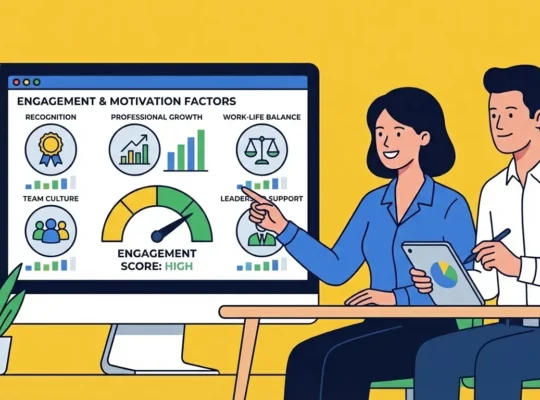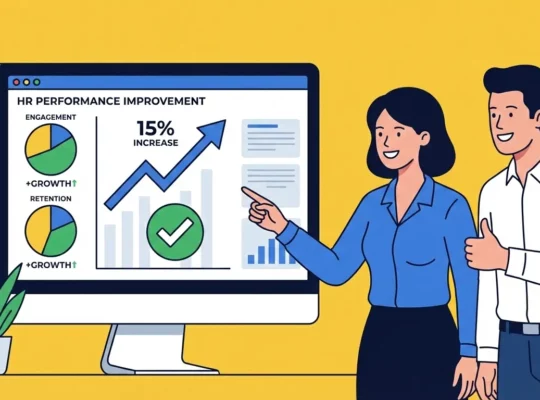In the world of management, setting and achieving professional development goals is key to driving success for both individuals and organizations. Professional development goals for managers are not just about enhancing individual skills but also about fostering a culture of continuous improvement within teams. At Review.jobs, we believe that empowering managers with the right development goals is essential for long-term growth and organizational success. This article explores the importance of professional development goals for managers and offers a comprehensive guide to mastering the skills necessary to lead effectively.
- Importance of Professional Development for Managers
- 10 Professional Development Goals for Managers
- Mastering Effective Communication
- Enhancing Leadership Skills
- Boosting Team Productivity
- Fostering a Positive Work Environment
- Developing Coaching and Mentorship Skills
- Adapting to Change
- Building and Maintaining Strong Networks
- Enhancing Decision-Making Skills
- Improving Work-Life Balance
- Cultivating Innovation and Creativity
- The Continuous Journey of Professional Development
I. Importance of Professional Development for Managers
Continuous professional development is crucial for managers who aim to lead effectively in today’s fast-paced work environment. The role of a manager is not just about overseeing tasks but also about guiding teams to success, making informed decisions, and fostering a positive work environment. This journey of growth requires managers to set clear, actionable development goals.
Impact of Managerial Growth on Team Performance
Setting professional development goals for managers is as crucial as setting goals for new employees. When managers invest in their own professional development, the ripple effects are felt throughout the organization. Enhanced leadership skills, better communication, and improved decision-making directly contribute to higher team performance. Moreover, a manager’s commitment to growth sets a powerful example for their team members, inspiring them to pursue their own professional goals.
II. 10 Professional Development Goals for Managers
1. Mastering Effective Communication
Effective communication is at the heart of successful management. It’s not just about speaking clearly but also about listening actively and ensuring that messages are understood by everyone involved.
Active Listening
Active listening is a critical skill for managers. It involves fully focusing on the speaker, understanding their message, and responding thoughtfully. This skill is vital in building trust within teams and ensuring that all voices are heard.
- Techniques for Improving Active Listening Skills:
- Maintain Eye Contact: Show the speaker you are engaged.
- Avoid Interrupting: Let the speaker finish before responding.
- Ask Clarifying Questions: Ensure you understand the message fully.
Encouraging team members to share their anonymous reviews can be an effective way for managers to gather honest feedback. Employee review management platforms like Review.jobs allow employees to voice their opinions freely, which can lead to actionable insights for improving team dynamics.
Clear and Concise Messaging
Managers must also excel in delivering clear and concise messages to their teams. Miscommunication can lead to confusion, errors, and a decline in team morale. Transparency in communication is crucial for building trust and ensuring that everyone is on the same page.
2. Enhancing Leadership Skills
Leadership is a skill that can be developed with the right strategies and resources. For managers, enhancing leadership skills is about more than just guiding a team; it’s about inspiring and motivating others to achieve their best.
Taking Leadership Courses
Formal leadership training can provide managers with the tools they need to lead effectively. Courses that focus on strategic thinking, conflict resolution, and team management are invaluable for any manager looking to sharpen their leadership skills.
Developing Emotional Intelligence
Emotional intelligence is the ability to understand and manage your own emotions, as well as recognize and respond to the emotions of others. Developing emotional intelligence can enhance your relationships, improve decision-making, and reduce stress.
Emotional intelligence (EQ) is the ability to recognize, understand, and manage our own emotions and the emotions of others. For managers, high EQ is essential for leading teams through challenges and fostering a positive work environment.
Strategies to Improve Emotional Intelligence:
Self-Awareness
- Reflect on your emotions: Pay attention to your feelings and how they influence your thoughts and behaviors.
- Identify triggers: Recognize situations or people that evoke strong emotional responses.
- Practice mindfulness: Engage in mindfulness exercises to increase self-awareness and reduce stress.
Empathy
- Active listening: Pay close attention to others’ words, body language, and emotions.
- Put yourself in their shoes: Try to understand their perspective and feelings.
- Validate their emotions: Acknowledge and respect their feelings, even if you don’t agree.
Regulation
- Develop stress management techniques: Practice relaxation techniques like deep breathing, meditation, or yoga.
- Challenge negative thoughts: Replace negative self-talk with positive affirmations.
- Seek support: Talk to friends, family, or a therapist about your emotions.
3. Boosting Team Productivity
A productive team is the cornerstone of any successful organization. Managers play a pivotal role in setting the stage for high productivity by establishing clear goals and effectively managing time and resources.
Setting Clear Goals and Expectations
Setting clear, achievable goals is essential for effective teamwork and organizational success. Managers play a crucial role in ensuring that team members understand their roles, responsibilities, and the broader objectives of the team.
SMART Goals for Managers
To ensure that goals are meaningful and actionable, managers should follow the SMART framework:
- Specific: Clearly define the desired outcome, avoiding vague or ambiguous language.
- Measurable: Set quantifiable targets that allow for tracking progress and assessing success.
- Achievable: Ensure goals are realistic and attainable within the given timeframe and resources.
- Relevant: Align goals with the overall organizational objectives and team priorities.
- Time-Bound: Set specific deadlines to create a sense of urgency and accountability.
Time Management and Delegation
Effective time management and delegation are essential skills for managers to navigate the demands of a busy work environment. By prioritizing tasks and empowering team members, managers can optimize productivity, reduce stress, and create a more fulfilling work experience.
Time Management Techniques
- Eisenhower Matrix: Categorize tasks based on urgency and importance to prioritize effectively.
- Time Blocking: Allocate specific time slots for focused work, minimizing distractions and improving productivity.
- Pomodoro Technique: Break work into timed intervals (typically 25 minutes) followed by short breaks to maintain concentration and prevent burnout.
- Task Prioritization: Use techniques like the ABCDE method to prioritize tasks based on urgency, importance, and impact.
The Power of Delegation
Delegation is not merely about offloading tasks; it’s a strategic tool for developing team members and maximizing productivity. By delegating appropriately, managers can:
- Empower Team Members: Foster a sense of ownership and responsibility among team members.
- Develop Talent: Provide opportunities for team members to learn new skills and take on challenging tasks.
- Increase Productivity: Free up time for managers to focus on high-impact activities.
- Build Trust: Demonstrate trust in team members’ abilities and capabilities.
4. Fostering a Positive Work Environment
A positive work environment is essential for team morale and productivity. Managers have the responsibility to create and maintain a workplace where team members feel valued, supported, and motivated.
Creating a Culture of Feedback
A culture of feedback is essential for continuous improvement, employee development, and overall organizational success. By encouraging regular feedback and open communication, managers can foster a supportive environment where employees feel comfortable sharing their thoughts and perspectives.
Techniques for Delivering and Receiving Feedback
- Be Specific: Focus on concrete examples and behaviors rather than making broad generalizations. This helps employees understand exactly what they need to improve or do differently.
- Balance Positive and Negative Feedback: Acknowledge and appreciate employees’ successes while providing constructive feedback on areas for improvement. This approach helps maintain morale and fosters a growth mindset.
- Encourage Two-Way Communication: Create a dialogue where employees feel comfortable sharing their thoughts, concerns, and feedback with their managers. This open communication fosters trust, builds relationships, and ensures that feedback is truly valuable.
Recognizing and Celebrating Achievements
Acknowledging and celebrating team achievements is essential for fostering a positive and motivating work environment. Recognition not only boosts morale but also reinforces desired behaviors and encourages continued high performance.
Ideas for Celebrating Successes
- Team Lunches or Outings: Organize social events to celebrate milestones and strengthen team bonds.
- Public Recognition: Acknowledge achievements in team meetings, company newsletters, or on social media platforms.
- Personalized Gifts: Show appreciation with thoughtful and meaningful gifts that reflect the individual’s interests or contributions.
- Awards and Certificates: Recognize outstanding performance with formal awards or certificates.
- Employee of the Month/Quarter Programs: Highlight exceptional contributions and inspire others to strive for excellence.
5. Developing Coaching and Mentorship Skills
Managers often serve as coaches and mentors to their team members. Developing these skills is essential for guiding team members through their career development and helping them reach their full potential.
Becoming a Better Coach
Coaching is not about providing answers but about guiding team members to discover solutions on their own. It’s a collaborative process that fosters growth, independence, and a sense of ownership.
Techniques for Coaching Team Members
- Ask Open-Ended Questions: Encourage critical thinking and exploration by posing open-ended questions that require more than a simple yes or no answer. For example, instead of asking “Did you complete the report?” ask “What progress have you made on the report?”
- Provide Constructive Feedback: Offer specific and actionable feedback that helps team members identify areas for improvement and develop new skills. Avoid generic or overly critical feedback.
- Support Goal Setting: Work with team members to set clear, achievable goals that align with their career aspirations and the team’s objectives. Provide guidance and support as they work towards these goals.
Mentorship Opportunities
Mentorship is a valuable relationship that can have a profound impact on an individual’s career development. By providing guidance, support, and insights, mentors can help mentees reach their full potential.
Benefits of Mentorship
For the Mentor:
- Leadership Development: Mentorship offers an opportunity to refine leadership skills, enhance communication abilities, and develop a deeper understanding of organizational dynamics.
- Giving Back: Mentors can contribute to the organization’s success by nurturing future leaders and sharing their knowledge and experience.
- Career Satisfaction: Mentoring can be a rewarding experience that enhances a mentor’s own job satisfaction and sense of fulfillment.
For the Mentee:
- Career Guidance: Mentors can provide valuable insights into career paths, industry trends, and organizational culture.
- Skill Development: Mentors can help mentees identify areas for improvement and develop new skills through coaching and feedback.
- Networking Opportunities: Mentorship relationships can open doors to new connections and career opportunities.
- Support and Encouragement: Mentors can offer emotional support, motivation, and guidance throughout a mentee’s career journey.
6. Adapting to Change
In today’s dynamic work environment, the ability to adapt to change is essential for managers. Leading a team through change requires a strategic approach and a willingness to embrace new challenges.
Change Management Techniques
Change management is a critical aspect of organizational success, ensuring that transitions occur smoothly and with minimal disruption. Effective change management strategies involve proactive communication, employee involvement, and ongoing support.
Key Strategies for Successful Change Management
- Transparent Communication: Keep employees informed about upcoming changes, their reasons, and potential impacts. Open and honest communication builds trust and reduces uncertainty.
- Employee Involvement: Foster a sense of ownership by involving employees in the change process. Seek input, address concerns, and empower employees to contribute to the transition.
- Support and Resources: Provide necessary resources, training, and mentorship to help employees adapt to the changes. This includes addressing potential challenges and providing guidance.
Continuous Learning and Upskilling
By continuously acquiring new skills, managers can adapt to changing demands, lead their teams more effectively, and remain competitive in their careers.
Recommendations for Ongoing Skill Development
- Online Courses: Platforms like Coursera, LinkedIn Learning, and Udemy offer a wide range of courses on various topics, from leadership and management to technical skills.
- Workshops and Seminars: Attend industry-specific events to stay updated on the latest trends, best practices, and emerging technologies.
- Reading and Research: Stay informed by reading books, articles, and research papers related to your field. Explore industry publications, blogs, and thought leadership pieces.
- Mentorship: Seek guidance and support from experienced professionals through mentorship programs.
- Networking: Connect with peers and industry experts to exchange knowledge and learn from their experiences.
7. Building and Maintaining Strong Networks
Networking is a powerful tool for managers. Building and maintaining strong professional relationships can open doors to new opportunities and provide valuable support throughout your career.
Networking Skills for Managers
Effective networking is essential for building strong relationships, expanding professional opportunities, and driving business success. While exchanging business cards is a common practice, true networking goes beyond superficial interactions. It’s about fostering genuine connections that can lead to mutually beneficial collaborations.
Tips for Building Professional Relationships
- Be Genuine: Focus on building authentic relationships based on shared interests, values, and goals. Avoid superficial interactions that lack substance.
- Active Listening: Show genuine interest in others by actively listening to their perspectives and experiences.
- Provide Value: Offer your expertise, insights, or resources to help others without expecting immediate returns.
- Follow-up: Maintain regular communication with your network to nurture relationships and stay top of mind.
- Leverage Social Media: Utilize platforms like LinkedIn to connect with professionals in your industry and expand your network.
Leveraging Networks for Team Success
Managers can harness the power of their professional networks to benefit their teams in various ways:
- Finding New Opportunities: Accessing a broader range of opportunities for team members, such as job openings, partnerships, or collaborations.
- Gaining Insights: Gathering valuable insights into industry trends, best practices, and emerging technologies.
- Securing Resources: Leveraging connections to obtain necessary resources, such as funding, equipment, or expertise.
- Building Credibility: Enhancing the team’s reputation and credibility within the industry.
8. Enhancing Decision-Making Skills
Good decision-making is at the core of effective management. Managers are often required to make decisions that have significant impacts on their teams and the organization as a whole. Developing strong decision-making skills involves a combination of critical thinking, problem-solving, and the ability to leverage data effectively.
Critical Thinking and Problem-Solving
Critical thinking allows managers to assess situations logically and make informed decisions. It involves analyzing information, considering various perspectives, and evaluating potential outcomes before taking action.
- Techniques for Improving Critical Thinking:
- Question Assumptions: Don’t take information at face value; dig deeper to understand the root causes.
- Evaluate Evidence: Consider the quality and relevance of the data you are using to make decisions.
- Consider Alternatives: Explore multiple solutions to a problem before deciding on the best course of action.
Problem-solving is closely tied to critical thinking. Managers need to identify challenges, break them down into manageable parts, and develop effective solutions. This skill is crucial for navigating complex situations and achieving long-term success.
Data-Driven Decision-Making
In today’s data-rich environment, managers have access to a wealth of information that can inform their decisions. Data-driven decision-making involves using data to guide choices, minimize risks, and optimize outcomes.
- Tools and Resources for Leveraging Data:
- Business Intelligence Software: Tools like Tableau and Power BI can help visualize and analyze data.
- Surveys and Feedback Tools: Collect data from team members and stakeholders to inform decisions.
- Analytics Platforms: Use platforms like Google Analytics to track performance metrics and identify trends.
9. Improving Work-Life Balance
Maintaining a healthy work-life balance is essential for both managers and their teams. It’s about finding the right equilibrium between professional responsibilities and personal well-being. Managers who prioritize work-life balance not only improve their own quality of life but also model positive behaviors for their teams.
Setting Boundaries
Setting clear boundaries between work and personal life is crucial for maintaining balance. Managers should establish and communicate these boundaries to ensure that work does not encroach on personal time.
- Strategies for Setting Boundaries:
- Define Working Hours: Set specific times for work and stick to them as much as possible.
- Limit After-Hours Communication: Encourage a culture where employees respect each other’s personal time.
- Use Technology Wisely: Leverage tools that help manage time and prevent work from spilling into personal life.
Stress Management Techniques
Stress is an inevitable part of any job, especially in management. However, managers can employ various techniques to manage stress effectively and maintain their well-being.
- Techniques for Managing Stress:
- Mindfulness and Meditation: Practice mindfulness to stay present and reduce anxiety.
- Physical Activity: Regular exercise can help alleviate stress and improve overall health.
- Time Management: Prioritize tasks and delegate responsibilities to prevent feeling overwhelmed.
10. Cultivating Innovation and Creativity
Innovation and creativity are key drivers of progress in any organization. Managers who cultivate these qualities within their teams can lead to breakthroughs and sustained success. Fostering a culture of innovation requires encouraging creative thinking, embracing new ideas, and allowing space for experimentation.
Encouraging Creative Thinking
Creative thinking involves looking at problems from different angles and coming up with innovative solutions. Managers can encourage this mindset by creating an environment where team members feel safe to express their ideas.
- Techniques for Fostering Creative Thinking:
- Brainstorming Sessions: Regularly hold sessions where team members can share ideas freely.
- Cross-Departmental Collaboration: Encourage collaboration between different teams to bring diverse perspectives.
- Allocate Time for Innovation: Set aside time for team members to work on creative projects or explore new ideas.
Implementing New Ideas
Innovation doesn’t end with generating ideas; it’s about putting those ideas into action. Managers must develop processes for testing and implementing new concepts while encouraging a fail-forward mentality.
- Processes for Implementing Ideas:
- Pilot Programs: Start with small-scale tests before rolling out new initiatives company-wide.
- Feedback Loops: Gather input from team members and stakeholders to refine ideas.
- Iterative Development: Continuously improve ideas through feedback and testing.
III. The Continuous Journey of Professional Development
Professional development is an ongoing journey that requires managers to regularly assess their skills, set new goals, and strive for continuous improvement. By focusing on key areas such as communication, leadership, decision-making, and work-life balance, managers can achieve sustained success and contribute to the long-term growth of their teams and organizations.
At Review.jobs, we recognize the importance of professional development goals for managers. By providing the tools and resources necessary for growth, we help managers and their teams achieve their full potential. Remember, the journey of professional development is never complete—it’s a continuous process that will help you reach new heights in your career and inspire those around you.





